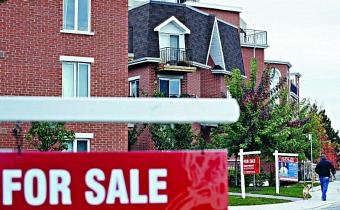Housing Crunch is the Bane of the LGBT Community: Teitel
Oh, the Toronto housing market: the real estate freak-show where a cool million dollars will land you your very own condemned bungalow. I’m exaggerating of course, but honestly, not by much.
The city’s prices are so unhinged they’ve inspired not just government intervention, but enough depressing newspaper articles to fill an entire waterfront condo. Some recurring themes: Toronto is one of the most unaffordable cities in the world. Millennials are doomed as usual. The only people who will ever own homes in the city already own them or happen to be very, very rich. In other words, welcome to the new feudalism.
But there’s another angle to the story of sky-high prices in the Six that hasn’t been done to death, an angle I can’t believe I never considered until today because it hits so close to home.
Read more:
Toronto housing market frenzy may be subsiding, some realtors say
Toronto homeowners cash out of hot real estate market as uncertainty sets in
Most in Toronto back Ottawa cooling the housing market: Poll
What will soaring house prices and a lack of affordable family rentals mean for LGBT people — specifically those of us who want to start families? My wife and I would like to have kids some time in the next few years, but the chance of us buying a house in Toronto, unassisted, is slim to none. If we do choose to buy, we will likely have to leave the city for the suburbs or who knows — the country — which won’t just mean a change of lifestyle, but a change in personal security and peace of mind.
LGBT people don’t just settle in cities because they prefer amenity-rich, walkable neighbourhoods with good coffee and good food (though we do tend to like these things a lot), but because there’s strength and comfort in numbers. It’s nice to be around your own kind, not only to avoid discrimination, but because where there are gay and trans people, there are resources for gay and trans people. And perhaps most importantly: if you live in a neighbourhood with a sizable LGBT population, there is far less chance your kid will be the only one in his or her class with two moms or two dads.
For queer families, the question of moving away from an urban centre isn’t a simple choice of city vs. suburbs; it’s a choice between continuing to blend in vs. sticking out like a sore thumb.
This isn’t to say in any way that suburban and country folk are inherently more homophobic than city folk. I grew up in the suburbs and I am a proud member of the 905 clan. I also know from first-hand experience that there are plenty of bigoted jerks in the city. But in the ‘burbs and in the country, there are also, without a doubt, far fewer openly queer people living in close proximity to each other, which means that kissing your same sex partner on the sidewalk or holding her hand in the grocery store elicits more stares in Richmond Hill than it does on the Danforth. And why wouldn’t it? We look longer at things we don’t see everyday.
This is one of many reasons LGBT people try to stick together in some fashion, even when they are priced out of urban centres. There’s a popular myth that increasing widespread tolerance of queer people in North America is slowly but surely making gay neighbourhoods obsolete. “But if that were the case,†says Amin Ghaziani, a sociology professor at the University of British Columbia and the author of the book There Goes the Gayborhood, “we would expect these LGBT individuals and families to disperse either across the city or in the suburbs. But that’s not what we see.â€
What we see, says Ghaziani, who has researched LGBT populations in major cities, is that gay and lesbian couples with kids form their own “cultural archipelagos,†typically in a suburb directly adjacent to the city in which they once lived. As an example, Ghaziani points to Oak Park, Illinois, a neighbourhood right outside Chicago that is now home to “multiple clusterings of same-sex households and same-sex households with children.â€
“There are still not enough families with same sex parents to make the neighbourhood a gay neighbourhood,†says Ghaziani, “but you walk down some streets and see a rainbow flag on the porch.†In other words, there’s a visible gay presence in the suburb of Oak Park.
Ghaziani says he wouldn’t be surprised if LGBT people in Toronto followed suit and queer-ified a suburb of our own.
There’s just one glaring problem: The suburbs of Toronto aren’t marginally cheaper than the city itself. Modest family homes in Richmond Hill, Mississauga, Newmarket etc., can put a person out nearly a million dollars or more.
Unless LGBT Torontonians make a collective decision to plant our rainbow flags somewhere moderately affordable (like, say, Niagara Falls) we may have no choice but to buck the gay suburb trend and disperse far and wide, where our kind is few and far between.
What we will lose, in the end, isn’t just a unified culture, a safety net, and a local bar that shows RuPaul’s Drag Race, but something arguably way more precious: the luxury of feeling ordinaryRead More..
Comments
There are 0 comments on this post





